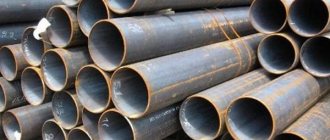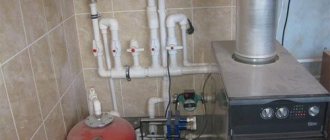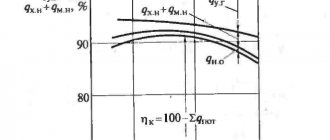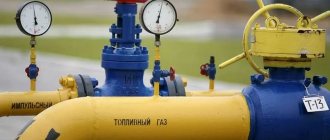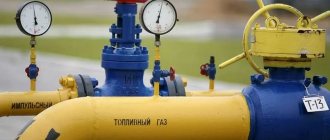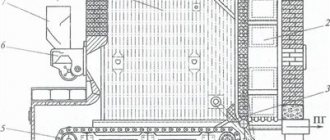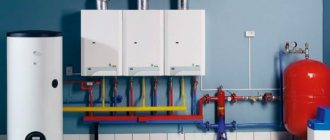Here you will learn:
- What determines the service life
- What you need to pay special attention to when choosing a gas boiler
- Standard service life of models from well-known manufacturers
- Price categories of gas boilers
- How to extend service life
It is believed that the duration of operation of the unit depends on its class. Thus, economy class models last on average from 7 to 12 years. In this case, the device is repaired as necessary. Middle-class models (mid-price category), as manufacturers promise, will work for 10–15 years.
Why does class count? Because cheap devices use lower quality materials, mechanical controls, and often do not have a display. They are not as efficient in operation and do not come with the latest features.
Boilers of the middle and highest price categories are equipped with components made of high-quality materials. They have built-in sensors, automation, self-diagnosis and useful functionality. Electronic controls and a display make use comfortable. But at the same time, the price of these devices is often “inflated” by the name of the manufacturer.
For example, such well-known brands as “Ariston”, “Bosch”, “Vailant” are much more expensive than less well-known ones. Dishonest companies take advantage of this and use lower quality Chinese components instead of expensive ones. As a result, you overpay, and the service life of a premium boiler is the same as in the economy segment.
Service life of a wall-mounted gas boiler
The service life of a wall-mounted gas boiler is significantly less than that of a floor-standing one. This is caused by several factors:
- In all wall-mounted boilers, the heat exchangers are made of copper, while in floor-standing boilers they are made of steel or cast iron. Despite the fact that copper makes the boiler light, it wears out faster and requires high purification of the coolant. If cleaning is not carried out in a timely manner, the copper will oxidize. Thus, a copper heat exchanger with proper operation can last 5-10 years (the manufacturer is of great importance);
- You should take into account the fact that wall-mounted boilers, as a rule, have lower power. Often during operation they have to work at full capacity, and this in turn shortens their service life.
Service life of a floor-standing gas boiler
Floor-standing gas boilers have a service life that is an order of magnitude longer. This is determined by the material of the heat exchanger. So, a steel heat exchanger can last up to 15-20 years, and a cast iron one even longer. In addition, floor-standing boilers rarely operate at full capacity, and if the coolant is thoroughly cleaned, then such a gas boiler will serve you for decades. If you remember the “Sovdepov” cast iron boilers, their service life sometimes reaches 50 years.
Also, the service life of gas boilers directly depends on the correct installation and further maintenance. Both floor-standing and wall-mounted boilers should be installed level and not at an angle, since the uniformity of heating depends on this. A timely inspection of the boiler will help to identify and replace worn parts in advance, thereby extending the service life of the unit.
It should be remembered that each manufacturer sets its own warranty period for the boiler, based on its technical characteristics. Therefore, for greater reliability, it is worth buying boilers from proven brands, for example, Vaillant, Dakon, Ferroli, and trusting their installation to professionals.
What determines the service life
The service life of any gas boiler is traditionally influenced by a number of factors. Which it is advisable to take into account before purchasing equipment.
Let's take a closer look at the main points that affect durability:
- Type of gas boiler.
- Type of gas burner.
- Efficiency and functionality of electronics.
- Price category.
- Terms of Use.
- Incorrect commissioning.
- Poor quality installation of heating systems.
- Wrong choice of boilers.
In addition, each point contains a lot of significant nuances that should be dealt with in detail.
Gas boilers are always affected by a large number of negative factors that can significantly reduce their service life. Whether this will become a reality or not depends only on the owner of the equipment
Heat exchanger material
Modern gas boilers are wall-mounted or floor-mounted. The first ones are compact and lightweight, so they are convenient to use in limited space. The second category of equipment is massive and large.
The features listed above are not just boiler characteristics, but factors that directly affect service life.
The reason is that developers are achieving lightness and compactness of mounted boilers by reducing the weight and dimensions of such an important design element as heat exchangers. As a result, the walls of the bodies of mounted models are thinner and prone to overheating, have less resistance to corrosion, and do not cope effectively with loads due to changes in coolant pressure.
In order for gas equipment to serve for a long time, the necessary installation and maintenance work must be carried out by specialists. This will reduce the likelihood of errors, and therefore extend the life of the boiler.
In addition, different materials are used for the manufacture of heat exchangers for both types of equipment. For example, copper is most often used for mounted boilers - as the lightest metal of all suitable for these purposes.
And this is the only advantage, because the performance characteristics of this material are close to mediocre. As evidenced by its tendency to oxidize and not the best protective qualities against pressure changes and their consequences.
Quite often, floor-standing boilers (less often wall-mounted) are equipped with stainless steel heat exchangers. But even with the same manufacturing material, the reliability of the design is not always the same - the walls of heat exchangers of ground-based products are usually much thicker, which extends the service life.
The most reliable metal used for the manufacture of heat exchangers is cast iron. It is resistant to corrosion, and if it is protected from significant pressure drops in the heating system and the resulting water hammer, then this metal will provide the longest service life to heating boilers.
When using a boiler, a significant amount of combustion products is always deposited on the surface of its heat exchanger, which must be removed. Otherwise, they can lead to overheating and breakdowns. And replacing this unit will not always be rational. For example, the cost of a bithermic heat exchanger can be an impressive 50% of the price of the entire gas boiler
The listed features lead to the fact that the difference in service life can be impressive.
Gas burner type
Thermal energy in boilers is generated by combustion of fuel. To ensure this procedure, gas-burning devices are used.
Namely the following varieties:
- atmospheric burner;
- forced air burner.
Boilers equipped with equipment of the first type - an atmospheric burner - have a shorter resource. The reason is the insufficient quality of combustion of the gas-air mixture. As a result, a large amount of soot remains, which is deposited on the surface of the heat exchanger, air ducts and other structural elements.
And if the boiler is not serviced in a timely manner, then after some time the layer of combustion products becomes sufficient to reduce the transfer of energy to the coolant. And the boiler, in order to perform the given modes, has to work more. Which leads to accelerated wear and subsequent breakdown.
The photo shows a boiler heat exchanger whose owners did not take any measures to extend its service life. As a result, the channels were almost completely clogged with dirt. And since heat exchange decreased due to this, the boiler had to work more, which led to overheating of the heat exchanger surfaces
Boilers equipped with forced-air burners do not have the disadvantage described above. Because a much larger amount of air is supplied here for fuel combustion.
This leads to its complete combustion, that is, a minimal amount of soot is formed. This means that the surfaces of the structural elements remain clean and the boiler does not need to solve the problem of heating the premises at the cost of wearing out its own parts.
Electronics functionality
Today, the service life of modern gas boilers used in heating systems directly depends on their automation.
Because electronics performs the following functions:
- selects optimal operating modes, which reduces operating hours and loads;
- performs self-diagnosis;
- prevents emergency situations that often become causes of breakdowns (for example, overheating);
- protects circulation pumps from blocking.
Automation of a gas boiler allows you to perform a number of other important tasks. Which, ultimately, extends the service life, preventing breakdowns.
The more advanced the electronics, the more functions it performs. And the likelihood of errors and failures leading to negative consequences is lower.
Boiler price and brand
In the field of gas heating equipment, there is a well-known rule - cheap cannot be good. Therefore, it is more likely that products from well-known European and Japanese brands will withstand many years of operation without breakdowns.
Chimneys must be checked annually, before the start of the heating season. But many owners, as well as inspectors, approach this requirement formally. The result of inaction can be seen in the photo, which shows a chimney pipe almost completely clogged
The reason is that the products of these manufacturers are designed to meet the stringent requirements of domestic markets. And high-quality materials are used in production. In addition, reputable companies have quality control in place, which reduces the number of non-conforming boilers leaving the factory.
Equipment operating conditions
The quality of the coolant has a significant impact on the service life. So, if the water is hard, highly acidic and contains various impurities and foreign particles, then there is no doubt that in a few years the heat exchanger channels will be clogged with scale or corroded by corrosion. Which will lead to early failure of the heating boiler.
Equally important to ensure longevity is the quantity and quality of air used to burn the gas. We discussed the reasons for this in detail above, in the paragraph “Type of gas burner”.
The main way to extend the service life is regular maintenance of boilers. This procedure requires special skills and tools, so not everyone can do the necessary work on their own. It is advisable to conclude a maintenance agreement with the gas company.
Despite the extra costs (payment for the services of a technician servicing the boiler), you should not save on maintenance, since maintenance can not only extend the service life, but also guarantee the safety of those living in the house
The following points can also lead to premature wear:
- increased humidity in the room where the heating boiler is installed;
- high/low temperatures, their differences.
Moreover, all of these factors actively influence durability, both during operation in cold weather and after the end of the heating season.
Errors during system installation
Poor installation of boilers leads to the fact that they do not operate at optimal conditions. Air often gets into the heat exchanger channels, and dust collects on the surfaces of the burners. Which leads to increased wear.
A common cause of boiler breakdowns is incorrect installation of radiators and other products with which heating equipment works.
Eg:
- Heating devices mounted at the wrong angle lead to heavy loads on the boilers. In addition, air appears in their channels, the presence of which leads to corrosion.
- An air vent installed in the wrong place will not work correctly. Which leads to airing of the system, and, consequently, to a decrease in its resource.
As a result, no matter how expensive and troublesome it may be, the shortcomings made during the installation of radiators and pipelines should be eliminated.
Wrong choice of boiler
Lack of productivity leads to increased loads on the heat exchanger, burner, pumps, which, in turn, leads to their subsequent wear.
The durability of gas boilers largely depends on their structural reliability. The stock of which can only be provided by well-known manufacturers with a good reputation
An equally problematic issue is excess power. Because of which boilers often turn on/off. And unsteady operating conditions are a direct path to premature wear.
We recommend that you familiarize yourself with the criteria for choosing the best gas boiler.
Installation method
There is a direct relationship between the service life and the type of gas heat generator, which can be floor-mounted or wall-mounted.
- Floor-standing, more monumental and powerful. Their construction uses materials that are resistant to high pressure and temperature.
For heat exchangers of floor-standing boilers, steel and cast iron are used, which have high strength characteristics.
- Mounted (wall-mounted) – lighter and more compact. The small dimensions and weight of the device are due to the heat exchanger material.
- As a rule, wall-mounted boilers use a copper heat exchanger, which, due to its high heat transfer, has smaller dimensions and weight. But copper is fragile and susceptible to corrosion, which leads to fairly rapid failure of the heat exchanger, especially with irregular maintenance.
You should know that steel heat exchangers, like copper ones, are susceptible to corrosion. That is why most of the leading manufacturers in this market segment use high-quality stainless steel to produce steel heat exchangers. Cast iron coils are not susceptible to corrosion, but are very sensitive to pressure changes. Both factors affect the lifespan of the boiler.
What you need to pay special attention to when choosing a gas boiler
With such a variety of different models, it is difficult to make a choice in favor of a specific one. But price should not be the main selection criterion. For effective operation, a modern boiler must meet a number of basic requirements: 1. No Frost system, which prevents freezing of the main components of the boiler, and in an improved form, the general heating system. 2. Improved or universal type of burner - conventional ones are not very economical. 3. Basic equipment should include: 3.1. A membrane-type expansion tank with a volume of at least 7% of the total volume of the heating network. 3.2. Circulation pump. 3.3. A set of sensors for monitoring the temperature of the coolant in the boiler, on the heating radiators, and preferably an air temperature control sensor. 4. Boilers from imported manufacturers must be adapted to the gas and electrical networks of Russia. 4.1. The presence of an automatic spotter on a piezocrystal or electric spark is mandatory. It is advisable to have a heating element with an incandescent element, which will make the operation of the boiler with low-calorie or unrefined fuel more economical and safe. 4.2. Products must be certified. 4.3. The range of operating pressure of gas and water is preferably the widest. 4.4. Built-in overvoltage protection system. Otherwise, you will have to buy and install an expensive filter. The possibility of connecting via a UPS with an output to an external battery is welcome.
Only after all the listed components are available and the requirements are met can the price of devices of comparable power be compared.
Each person chooses the best for himself. Each buyer puts their own meaning into the concept of “best”. Reliability? Safety? Price? Appearance? All this can be correlated with gas boilers. What are the best gas heating boilers? It all depends on what functions are your priority.
Many gas boilers have an automation system, pumps that run on electricity. Such boilers cannot function without a constant supply of electricity. If there are power outages, such devices will not be suitable.
It is necessary to think about what type of boiler is suitable for housing: floor-mounted or wall-mounted. If you need a high-power boiler, then it is best to choose a floor-standing type of equipment. The disadvantage of such a unit is that it requires a separate room. For a regular kitchen, a more compact option is suitable - a wall-mounted boiler.
It is worth considering such characteristics of boilers as the type of combustion chamber. Equipment with an open chamber burns the air in the room. Such boilers require an equipped chimney and a constant flow of air from outside. It should also be taken into account that their body overheats, so a boiler with an open combustion chamber should not be installed next to meters, wooden furniture and curtains. Boilers with a closed chamber have a coaxial pipe in their structure, which absorbs air from the street and exhausts it back. Such a boiler is an economical option, since gas and air are uniformly mixed in the coaxial pipe, so the boiler body with a closed combustion chamber does not overheat.
The modern market presents a choice of gas heating boilers to suit your taste, and which one is better for the buyer to decide. The choice of equipment depends on the needs that are most important to the consumer.
Results
So, we can draw the following conclusions:
- do not save when buying a boiler; more expensive models will provide your home with uninterrupted heating for several decades;
- choose floor-standing models with a cast iron heat exchanger;
- engage only professionals for installation and maintenance of the boiler;
- Follow all operating rules established by the manufacturer.
By fulfilling all these requirements, your boiler will operate smoothly, economically and safely for several decades!
Standard service life of models from well-known manufacturers
The standard service life (declared by the manufacturer in the model documentation) is calculated from the date of commissioning, i.e. from the date of installation and first start-up, not the production of heating equipment. For most of their models (with regular maintenance), well-known manufacturers predict the following service life:
- AOGV – 10 years.
- Ariston - 8-10 years old.
- Baksi – 12-15 years old.
- Bosch – 12 years old.
- Vaillant – 10-15 years.
- Wissman – 15-20 years old.
- Lemax – 11-14 years old.
- Navien – 10 years old.
- Proterm – 10-12 years.
- Rinnai – 10-12 years old.
Number of circuits
All models of gas boiler systems present on the Russian market are classified by the number of circuits.
…
- Single-circuit ones are designed only for heating the coolant circulating in the heating system.
- Double-circuit ones are designed for heating and creating domestic hot water at home.
Single-circuit installations are simpler and therefore more repairable. Double-circuit, they have a lot of design features that significantly increase the cost of maintenance and repair in the event of failure of its elements.
Important! Despite the widespread belief that simplicity is the key to reliability, the number of circuits of a heating unit does not in any way affect its lifespan.
Check out the Review of wall-mounted gas boilers https://oteple.com/obzory-nastennyx-gazovyx-kotlov/
Do you want to know how to install a wall-mounted gas boiler with your own hands?
Gas boiler Buderus 60 kW power and reliability
Price categories of gas boilers
As a rule, the retail price of a boiler is one of the indicators of its reliability. Condensing heating systems belong to the most expensive category of heating equipment.
With proper operation and regular maintenance, the declared life of such units is 30 years. This is due to the use of high-quality materials, which are necessary when obtaining thermal energy from combustible fuel and condensate.
Convection boiler equipment usually falls into the middle price category. The average lifespan of installations of this type declared by the manufacturer varies from 10 to 15 years. In convection heat generators, thermal energy is obtained exclusively through gas combustion, which leads to higher temperature loads on materials.
Additional information about the device: information about heat exchangers
Water-tube and fire-tube heat exchangers have their own pros and cons, but are used equally successfully in industrial heating equipment. It is impossible to answer the question of which type of heat exchanger is better. It all depends on the specific case.
For example, a boiler from the manufacturer Ferroli with a power of 8 MW has a coolant pressure of up to 10 bar. The design in this case is fire tube and has three gas passages. The devices of this company have proven themselves to be reliable and efficient units that are used in various enterprises around the world.
But other Italian manufacturers offer for sale steam-generating industrial gas boilers with water-tube heat exchangers, which have high productivity. To increase the efficiency of thermal installations, economizers are used. They are needed so that the device has the ability to extract thermal energy from the exhaust gases. These nodes are additional devices. They are supplied complete with the boiler. Sometimes economizers are built into the unit, as is the case with the Viessmann Vitomax 200HS equipment.
If you look at it, this is another fire tube device, which is located at the end of the duct and lowers the temperature of the flue gases. This makes it possible to achieve an increase in efficiency by 6%, which is good savings despite the impressive volume of fuel consumption.
How to choose a gas meter
Despite the fact that in order to approve the project for installing a metering device, it is necessary to provide a data sheet for the flow meter, the choice of equipment should be made only after consultation with specialists. You should definitely inquire about the list of approved devices, since unlicensed devices will not be put into operation.
In order to select a flow meter, you should take into account its technical characteristics, especially paying attention to two criteria: throughput and type of device
The first criterion depends on the number and power of gas appliances installed in the house. For one slab, for example, a throughput of 1.6 m3/hour is sufficient. This parameter is indicated on the front panel and can be found out by looking at the value indicated after the letter “G”, that is, in this case you need a device marked G1.6.
The choice of meter depends on the throughput of gas appliances. For example, if for a gas stove it ranges from 0.015 to 1.2 m3/hour, then a meter with parameters of 1.6 m3/hour is optimal. In the event that several devices are installed and operated, then the minimum values of the least powerful and the maximum data of the highest consumption should be taken into account.
But you need to take into account that choosing an ideal flow meter for such a requirement is often an impossible task, so maximum values are taken into account. For example, if the minimum consumption of the stove is 0.015 m3/hour, and the maximum throughput of the boiler is 3.6 m3/hour, then you should purchase a meter marked G4
However, it is imperative to take into account the fact that the meter will be allowed to be installed if the deviation in the minimum value does not exceed 0.005 m3/hour. Otherwise, it may be necessary to install separate metering devices and, as a result, maintain two separate personal accounts
Main types of household gas meters
When choosing a meter, you should definitely take into account its type, which determines the principle of its operation, as well as the accuracy of the data obtained. Based on this criterion, individual consumers can choose devices:
- membrane These gas meters are distinguished by their low price, high reliability and completely reliable values. But they are very noisy devices;
- rotary devices. These devices are popular because of their compact size and fairly low price, but they have a short service life and are not highly accurate in the measurements obtained;
- ultrasonic devices. These meters are electronic devices and have high measurement accuracy. They are quite compact, silent and can be integrated into an overall system for remote data transfer.
Also, when choosing a gas meter, you should take into account its installation location, since these devices are right- and left-handed
It is also necessary to take into account what section of the pipe the installation will be carried out on: horizontal or vertical. You also need to decide on the location of the gas meter: in the house, in a warm, heated room, or on the street
In the latter case, you should buy a device with thermal correction, as evidenced by the letter “T” on the front panel of the device, indicated next to the throughput of the device.
Particular attention should be paid to the date of manufacture of the meter, since it is the starting point for determining the verification interval, which is individual and ranges from 3 to 15 years
Electronic components and power supply
Today, all models of gas heating equipment present on the domestic market are equipped with automation, which can be non-volatile or require connection from a household AC network. One of the factors that leads to breakdowns and reduced service life of gas boilers is the unstable operation of electrical networks. A normal power surge can easily damage the elements of the control unit, controller, ignition system, gas valve, and other electronic and electrically controlled components.
Advice: If you want the lifespan of your boiler system not to be lower than that declared by the manufacturer, then choose models with a built-in voltage stabilizer or use an uninterruptible power supply in the device’s power supply circuit.
What will lead to success?
First of all, this is a skill
. Only personal experience will help you win in the future.
In second place is top-end technology. Experienced gamers do not recommend using stock vehicles, since slow tanks that do not provide effective fire support are too boring
That is why it is important to improve tanks to the top with the help of free experience
An important factor is. Training and retraining are best done using gold.
In every battle, you should have gold shells with you, which are more effective at penetrating opponents. The more often this happens, the better the team's result.
Selection of heating equipment
When choosing heating equipment, key importance must be given to its power and materials of manufacture in order to avoid purchasing an expensive boiler that has no obvious advantages and, at the same time, does not reach the required power, and therefore is forced to work at the limit of its capabilities. Parameters such as the size of the house, the pressure level in the gas pipeline, the thermal insulation of walls, etc. should serve as a guide. They form the value of heat loss, based on which the boiler power is selected.
Due to the nature of the material, cast iron boilers are the most durable. Therefore, if you want a boiler with the longest service life, you should pay attention to these representatives.

